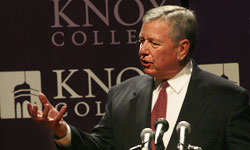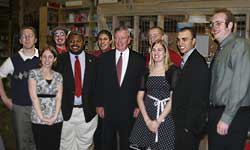

Venture Boldly

Office of Communications
2 East South Street
Galesburg, IL 61401

Following the attacks on September 11, 2001, in which 3,000 people were killed in airplane crashes caused by terrorist suicide squads, "prevention became our goal," said former United States Attorney General John Ashcroft, in a lecture April 22 at Knox College.
The Justice Department, he said, changed from a "retrospective effort to recreate the past and adjudicate innocence or guilt... to a prospective effort to anticipate the future... to find out about things that you can't allow to happen again." To anticipate the future, "you have to sift information," which requires new technology, Ashcroft said.
Ashcroft cited wiretaps, which prior to the USA PATRIOT Act could take weeks to approve and had long been restricted to surveillance of a specific telephone. To combat the use of technology -- cheap, single-use cell phones -- first by drug dealers and later by terrorists, Ashcroft said that Congress "provided the authority for 'roving wiretaps' to surveil a person, not a piece of equipment."
The capacity audience estimated at 700 in Harbach Theatre included a dozen students who stood, wearing black hoods, during part of Ashcroft's talk, to protest the treatment of detainees in U.S. custody. Outside the lecture, students displayed signs and distributed flyers critical of Ashcroft, and several of the questions during the Q-and-A characterized U.S. interrogation methods as torture.
"Congress passed the law that defines torture [as causing] significant, long-term damage," Ashcroft responded. "If the law needs to be changed, talk to your Congressman."
Ashcroft said he opposed the notion that security has to be balanced against freedom. "I don't believe that security is a core value," he said. "The reason to have security is to have liberty." Laws against murder and rape and slavery increase our freedom, Ashcroft said. "I reject any law that doesn't make liberty more meaningful."
The balance that has to be achieved is between "an aspiration for security and an aspiration for privacy," Ashcroft said. But the sharing of private information is not a threat, if correctly handled, he said. Private information is vital to health care, in tracking and fighting disease, and to national security, in tracking and fighting terrorism, Ashcroft said. "It's going to take a finely tuned effort... It can be done and it's your job to do it."
The lecture was sponsored by the Knox Republicans, a student group; with support from individual alumni donors and the Young America's Foundation through its Harold Simmons Lecture Series.

Former U.S. Attorney General John Ashcroft speaking in Harbach Theatre; below, full house audience estimated at 700; bottom, Ashcroft with students in the Knox Republicans.

Published on April 23, 2008